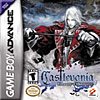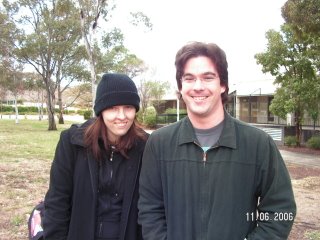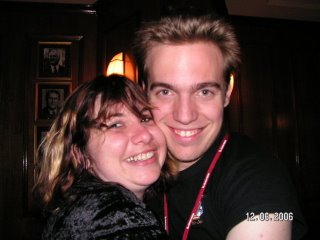
[News] [Politics] [Computer Gaming]
Good news, fellow citizens and prolefeed readers! The Office of Film and Literature Classification, also known as OFLC, or, colloquially, Miniclass, has once again saved loyal citizens of Australia from accidentally committing thoughtcrime, which as we all know would be
doubleplusungood. Publisher Eidos Interactive's latest videogame,
Reservoir Dogs, an adaptation of the Quentin Tarantino film of the same name, was last Friday refused classfication by Miniclass on the grounds that it was unsuitable for the highest classification rating available for videogames, being MA15+.
This means that
Reservoir Dogs, in the form it was submitted, can not legally be advertised, sold, or purchased in Australia. Distributor Atari Australia has chosen not to release the game in Australia, rather than change and resubmit the game or contest the ruling.
1984 to one side, this is the continuation of a very disturbing trend.
Reservoir Dogs joins a steadily growing list of games which have been completely banned in Australia, including some very good games such as the original version of
Grand Theft Auto: San Andreas, some very bad games such as
Manhunt and
Postal, and some games that nobody can make up their mind about, like
Mark Ecko's Getting Up.
Was
Reservoir Dogs one of the good ones, or the bad ones? Well, if you're an Australian, you'll never get to find out, because you can't legally get your hands on a copy without leaving the country. Did it deserve to be banned? You won't know, because you can't play the game.
This is why censorship decisions are so dangerous and insidious. The nature of censorship means that you have no way of coming to your own opinion about whether the decision was justified. (Well, personally, I don't think government censorship is EVER justified, but you don't have to go that far to still appreciate the problem.)
How did the game get banned?Now, as far as I can find, OFLC have not issued a statement of their reasons for the classification decision. However, assuming that the game bears exactly the same level of content as the original film, or slightly less, it would still be refused classification (read: banned). Australia does not have R18+ or X classification categories for games. Games that do not fit into MA15+ cannot be advertised, sold, or purchased in Australia.
Who the heck are the OFLC?The Office of Film and Literature Classification (OFLC), who are not
really known as Miniclass (but probably should be), are a body established under the Classification (Publications, Films and Video Games) Act 1995 to act as the classification authority for the Commonwealth of Australia.
What is the mandate of the OFLC?You know, you'd think they'd have one. Most statutory organisations actually have a little section in their legislation which sets out their legislative objectives - that is, the goals they are to strive for on behalf of the Australian community. As best as I can tell, the OFLC does not. Which is a fairly critical ommission. Are they established to police the morality of the Australian community (which seems to be what they're doing)? Or are they established to inform consumer choices and regulate appropriate channels of advertising for potentially offensive content?
What do the OFLC take into account in making decisions?Section 11 of the Classification Act specifies the matters to be taken into account in making classification decisions, and contains the following:
The matters to be taken into account in making a decision on the classification of a publication, a film or computer game include:
(a) the standards of morality, decency and propriety generally accepted by reasonable adults; and
(b) the literary, artistic or educational merit (if any) of the publication, film or computer game; and
(c) the general character of the publication, film or computer game, including whether it is of a medical, legal or scientific character; and
(d) the persons or class of persons to or amongst whom it is published or is intended or likely to be published.
So as you can see, it's not just a checklist - they can't just tick the box for "murder" and declare it to be not worthy of classification. They have to take into account the artistic and literary merit - and don't laugh, the US Supreme Court was quite happy to find that David Jaffe's opus
God of War was possessed of overriding artistic merit. They have to take into account the general character of the publication. And did they do that? It's a bit hard to tell when we can't see the game to make up our own minds.
How does the OFLC make decisions about the content of a game?Well, the OFLC gives out very little info on this, but I understand it's done entirely on the basis of the information submitted by the party submitting the game for classification. That's right -
they don't play the game. Are alarm bells ringing for you, too? How do they
possibly judge the artistic merit of a game without playing it? Sure, you could say that presumably the developer/publisher/distributor puts their best foot forwards, and if the OFLC can't give it an appropriate classification based on that, then they're not going to do any better playing it themselves. But that's just rubbish. When you're making a decision as a government body to block content from the Australian public, it's just not good enough to point at a private company and say, "Well, they said it had violence in it." As a principle of administrative law, they're required to satisfy themselves of each matter relevant to the decision, and reading someone else's precis doesn't even come close to meeting that.
But aren't they just games? Why does it matter?Games are a form of expression, just as much as film or comics. Up to now, commercial releases have been generally fairly lacking in intellectual depth... much like comics in the 60s. But just like comics, they're capable of just about anything you care to say with them. Let's put it this way - and you can happily assume the best possible version of the games above, where they really nail the spirit and message of the source material in a tasteful and meaningful fashion. If they had been videogames, ALL of the following content would have been banned.
Comics*
V for Vendetta* Watchmen* Sandman* Swamp Thing* The InvisiblesBooks*
Lolita* American Psycho* Fear and Loathing in Las Vegas* Catch-22* The Satanic VersesMovies* Taxi Driver* The Exorcist* Pulp Fiction* American Beauty* Silence of the Lambs
* Seven* Full Metal Jacket* Omen* The Shining* LolitaAnd whether you like those titles or think they're gratuitous, you can't help but agree that they have been major and definitive moments in the history of art, and their existence has been thoroughly worthwhile if only for the debate it's generated. I'm quite happy to stand by that list. If those titles had been created with their complete original narrative and artistic decisions, in the medium of a piece of software with the occasional bout of interactivity, they would have been banned in Australia. And that's just me thinking for about five minutes - I'm sure I've missed some real corkers of "R" type content that we'd weep to see lost.
But at least it's not political, right?Um... yeah. If you say so. But you should probably be aware that there's some pretty solid evidence that the
Mark Ecko decision occurred in the context of some political pressure coming down on the OFLC from certain Queensland politicians. And while the OFLC doesn't seem to be, strictly speaking, subject to the direction of the Minister, it's worth noting that the members of the board are appointed directly by the Minister, and don't have tenure - that is, if they don't please the Minister, they probably don't get reappointed. There are also certain circumstances under which the Governor-General (read: Minister) can fire members of the board. It'd be a brave board member indeed who said, "No, Minister, we think
Reservoir Dogs is actually quite artistically good, and we're going to classify it no matter what you might think."
So what can I do about this?Make noise!
Write to the OFLC, and express your extreme displeasure that the Australian public are denied the right to make their own decisions about games as rational adults.
Write to the Commonwealth Attorney-General, Phillip Ruddock, and let him know how unhappy you are with the current state of Australian classification legislation, particularly the lack of an R classification for video games. Get the attention of your local member of Parliament, either state or federal, and convince them to raise their voice on the floor of the House!
Remember, right now, as we speak, someone is contemplating creating the
Citizen Kane of games, and deciding that it's too risky to make a huge artistically-interesting game and have it blacklisted by the censors. They're going to look at Australian legislation, and just give up and make another bad
Half-Life clone instead.
Note: That Attorney-General link above goes to an email address that's just a reasonable guess based on the structure of Federal MP Parliament House email addresses. It may not exist, and Mr Ruddock may or may not check it. For some reason Mr Ruddock seems hesitant to provide Australia with an email addresss... but you can always ring him on (02) 9482 7111!
 The next Carnival of Gamers is coming up on July 6 (next Thursday), and this time around it's being hosted by Ron "Monkey Island" Gilbert, over at Grumpy Gamer. Once again, I'll be submitting a post, and hopefully, unlike last time, my submission will actually appear in the Carnival.
The next Carnival of Gamers is coming up on July 6 (next Thursday), and this time around it's being hosted by Ron "Monkey Island" Gilbert, over at Grumpy Gamer. Once again, I'll be submitting a post, and hopefully, unlike last time, my submission will actually appear in the Carnival.











